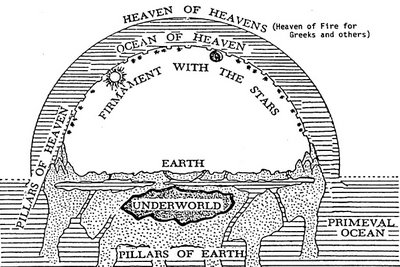more inspiration and accommodation

And God said, "Let there be an expanse/firmament/vault/dome (Heb., 'raqiya') in the midst of the waters, and let it separate the waters from the waters." -Genesis 1:6
“Moses describes the special use of this expanse, “to divide the waters from the waters,” from which words arises a great difficulty. For it appears opposed to common sense, and quite incredible, that there should be waters above the heaven. Hence some resort to allegory, and philosophize concerning angels; but quite beside the purpose. For, to my mind, this is a certain principle, that nothing is here treated of but the visible form of the world. He who would learn astronomy, and other recondite arts, let him go elsewhere.”
- John Calvin, Commentaries on the First Book of Moses called Genesis, 1:6
§
"It is a fundamental misunderstanding of Genesis to expect it to answer questions generated by a modern worldview, such as whether the days were literal or figurative, or whether the days of creation can be lined up with modern science, or whether the flood was local or universal. The question that Genesis is prepared to answer is whether Yahweh, the God of Israel, is worthy of worship. And that point is made not by allowing ancient Israelites to catch a glimpse of a spherical earth or a heliocentric universe. It is wholly incomprehensible to think that thousands of years ago God would have felt constrained to speak in a way that would be meaningful only to Westerners several thousand years later. To do so borders on modern, Western arrogance. Rather, Genesis makes its case in a way that ancient men and women would have readily understood--indeed, the only way."
- Peter Enns, Inspiration and Incarnation, p. 55
I just thought it'd be good to give some more examples of the affinities between Calvin's doctrine of divine accommodation in Scripture and the uses to which Calvin put this doctrine and examples of the uses to which Enns has put his incarnational analogy. Enns may have done some slightly different things with Genesis than did Calvin. Of course he did. Calvin didn't have available the ancient near eastern literature to set Genesis in its historical and literary context whereas we and Enns do. But isn't it obvious that there are at least striking, even familial, resemblances between Enns' approach and Calvin's here?

6 Comments:
yeah, i don't know what this guy ^^ is talking about. i actually just started reading Enn's book for Biblical Interpretation.
i remember in college (and again at WTS) having to learn about the ancient view of the world and how this applies and helps explain how Moses tells us God made the earth. personally, i think it's pretty awesome that God was willing to bring His language down to our level so that the wee Israelites could understand the enormity of Creation. why can't people focus on this fact, instead of how our current science-saturated culture doesn't line up with ancient texts? God could have explained Creation "scientifically" (even though these are human terms and definitions), but He would have seriously lost and confused the Israelites. even if He had used scientific terms, in another 2000 years science will have advanced so much that those terms would again be obsolete.
you encourage me. especially with regards to reading Enn's book.
I think the comment before yours was a bit of spam. I've been getting those lately.
Thanks for the comments. Your point about the shifting sands of science is worth a blog post of its own. I picked up a great example of the sort of it from Nicholas Wolterstorff and I may share it here soon (I've got pictures and stuff to illustrate!)
pictures! how very exciting. and yes, i see now that the comment i referenced was spam, as it was stupid. oh well! i look forward to reading your next post, as i have more educational history in science than i do in religion. (hence my dirth of comments, as i usually feel too unscholarly to respond).
i am not really hearing/reading anything i necessarily disagree with in Enn's class. an unrelated (maybe?)
question i did not get to ask you tonight...i don't know much about npp but as far as i understand, buying into it implies rejecting the doctrine of the imputed righteousness of Christ. as i said, i am not even sure how/why that is the case. nevertheless that sounds problematic to me. it is like taking back the reformation! any thoughts?
Hey Taty,
I'm no NPP expert but I don't think that NPP necessarily entails the denial of the imputation of Christ's righteousness. Really what the NPP can do is cause us to question whether Paul was actually teaching or thinking of that doctrine in certain specific passages of his epistles. Theoretically the doctrine of the imputation of Christ's righteousness could be true or even biblical even if Paul never penned or breathed a word about it. But in any case, I don't think that differing with Luther on imputation necessarily constitutes "taking back the Reformation," at least not in the sense that we would all have to convert to Roman Catholicism. That's a bit like saying that if one disagrees with Einstein, one might as well go back to Newtonian physics. Just as there are more options today in physical theory than just Einstein's theory and Newton's, so there are more options in theology today than just strict confession of the WCF and Roman Catholicism.
Michaela, true, they will probably not let you in ("they" being "the Man," namely, "the Man who's always tryin' to keep me down"). But, nevertheless, we'd love to have you come and chill and chat with us. You and Art should join team UJ's next time you're in Philly.
hmmm...i may almost be convinced...
Post a Comment
<< Home